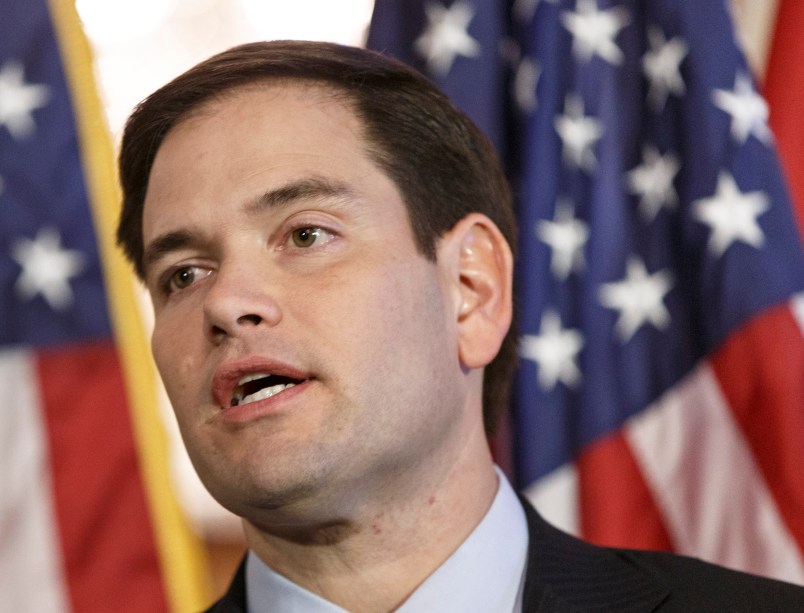As 2016 nears, get ready for a lot of talk about how the Latino vote just might tip the presidential election to the Republicans. A Latino candidate like Marco Rubio will do it! A pro-immigration reform candidate like Jeb Bush will do it!
All this talk is exciting for political strategy junkies since Latinos could decide the election in swing states like Florida and Colorado. True, Rubio or Bush would likely gain more Latino votes than an adamant opponent of a path to citizenship like Ted Cruz. But the basic premise of the argument is false. The real do-or-die year for the GOP, when it comes to Latino voters, is not 2016. It’s 2017.
Let me explain. First, Latinos are not swing voters anymore (if they ever were). In 2016, the GOP will almost certainly lose the majority of Latino votes. George W. Bush’s 2004 win, in which he pulled over 40 percent of Latino votes, is likely to remain the high tide for the GOP.
Latinos lean Democratic for many reasons.
First of all, Latinos are, on average, much younger than non-Latino white people. Young Americans—including young Latinos—tend to be progressive on many issues from supporting same sex marriage to believing in an active government.
Secondly, political cultures in nations from Mexico to South America have tended to support a much more active role for government. Most Latin American nations have at least one popular political party that is further to the left than the Democratic Party, and many of their right-leaning parties are much more progressive, at least on certain issues, than Republicans in the U.S. When people steeped in these political traditions move to the United States and become citizens, they are highly unlikely to join the GOP. And remember, political values are often passed down in families from one generation to the next.
And of course, immigration is a major reason for Latino’s Democratic tilt. According to the latest poll from Latino Decisions for the Robert Wood Johnson Center at University of New Mexico, some 61 percent of Latinos say they know someone who may be undocumented. Coverage of immigration reform has been relentless in Latino media. To have any chance of winning Latino votes, the GOP must shed its anti-immigrant reputation.
2016 is not likely to be the time. The GOP presidential primary will feature an anti-immigration carnival, as candidates kowtow to the Tea Party in states like Iowa, New Hampshire and South Carolina. A candidate who supports a pathway to citizenship as part of comprehensive immigration reform is highly unlikely to win the nomination. If one does—I’m looking at you, Jeb Bush—then there is a chance for the GOP to make incremental increases in Latino vote share in the general election. And this chance will be increased by putting a Latino like Susana Martinez on the ticket for VP.
Still, any increase in the GOP Latino vote for the 2016 election will be marginal at best.
But what if the GOP wins the election? That’s where history hinges. In 2017, a pro-pathway GOP President Bush—or any Democratic president—will likely take another shot at comprehensive immigration reform.
If 2016 gives us another Democratic president, the trends and politics of the past eight years will continue, and whether or not reform passes, Latinos will continue to recognize Democrats as their party. While there will be, of course, some pro-pathway GOP members of Congress, the GOP will remain the home of the vast majority of anti-immigrant hardliners. Gratitude to Democrats for successful bill passage (and/or anger towards the GOP for continuing to block it) will lock in Latinos as a Democratic voting bloc. Latino support for Democrats may trend towards the 70 percent mark.
On the other hand, if a pro-pathway Republican wins the presidency in 2016 (or if anti-immigration GOP president does a Nixon-goes-to-China change of heart), all bets are off. With presidential cover, a bipartisan bill will pass, and the GOP will share some of the credit.
How much that credit will matter to the future of the Latino vote will depend in part on the GOP’s ability to build on the momentum. To win more Latino votes, the GOP will have to put forward high-profile Latino candidates and appointed office holders. But Republicans will have to do more than that: They need to moderate their stance on both social issues, like gay marriage, and economic issues, like inequality. But those things may already be happening.
In that scenario, Latinos may be held to a rough 55 percent to 65 percent voting share for Democrats. That’s a bad case for the Democrats, and a best case for the GOP. If it happens, the often cited “emerging Democratic majority” that Ruy Teixeira, John Judis and others have written about may be less durable than once hoped.
So what can Democrats do, other than simply hope someone like Jeb doesn’t win and work to defeat him? The answers are clear: never take demographics for granted, and offer policies that address the real needs of Latinos. According to the Robert Wood Johnson Center poll, 36 percent of Latinos say that they have personally experienced discrimination because of their race or ethnicity and 18 percent still don’t have health insurance. These problems—not to mention the grinding economic needs of working Latino families—must be addressed with attractive policies. And Democrats must raise up Latino leaders at every level. Otherwise, Dems may swiftly say goodbye to that presidential majority.
Avi Green, a former political consultant, created strategies for several ground-breaking Latinos and other candidates of color.






